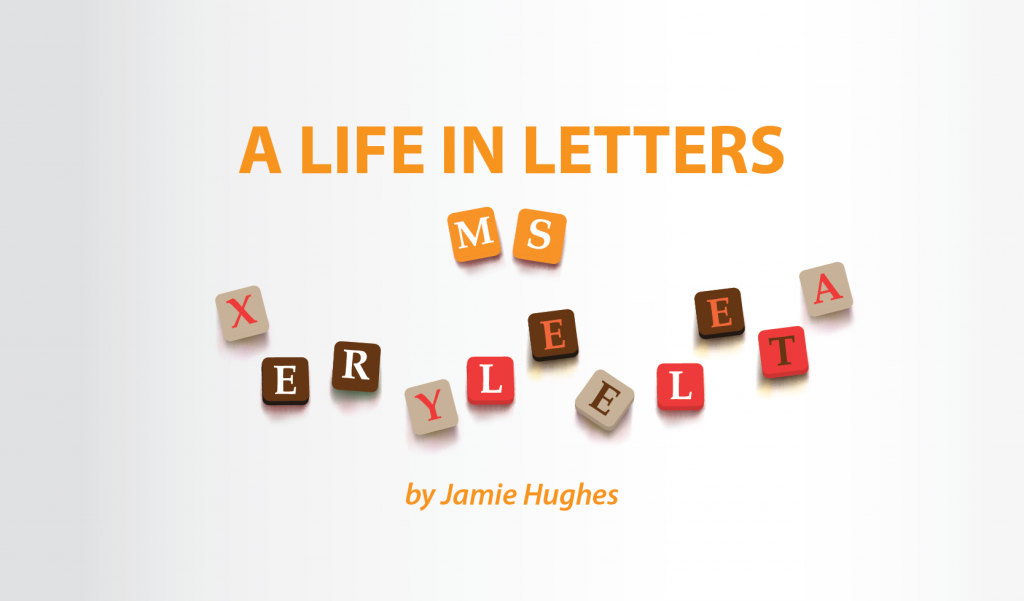Giving Your Brain a Good Stretch
Written by |


I turned 40 this year, and it seemed like a mighty fine time to stop and take stock. After all, I’m at the midway point, and if I want the second half of my life to be as fun and productive as the first, I have to make good intentional choices. Having multiple sclerosis makes this doubly important because all of the things that naturally come with aging — vision issues, physical troubles, and mental and emotional changes — served with a side of crazy coleslaw, thanks to my disease.
Yes, it’s important to have a healthy diet and get plenty of exercise, and there are tons of posts on this site to help you accomplish those goals. (Truth be told, I could stand to read a few of them myself!) What I want to talk about in this column is mental and emotional well-being. It’s easy to see when the old waistline is plumping up, but it’s a little harder to tell when you’re getting flabby around the midbrain.
I don’t normally tote water for “Queen O,” but I recently found a solid article on her website called “Four Ways to Keep Your Brain Limber.” In this piece, experts argue that four things — insight, behavior, emotion, and focus — are key to having a healthy mind. And if you’re living with MS, caring for the brain is essential.
Insight — Socrates said, “The unexamined life is not worth living,” and I concur. Too often, we live by a set of rules, never once questioning why we do certain things or how we’re limiting ourselves through blind adherence to a set pattern. We must be willing to push ourselves into new spaces and leave comfort zones. If we don’t, our minds can become calcified, rigid, and uncompromising.
Taking in new information, especially when it clashes with what we’ve used to build our worldview, can be challenging. However, in this age of incivility and political strife, thinking for oneself, and being able to appreciate something from multiple points of view is essential. This comic from The Oatmeal is a useful jumping-off point for this exercise, a way to ease you into this newer and more challenging way of thinking. (And it comes in both profanity-laced and profanity-free versions. Choose your own adventure!)
I also find it helpful to do an “engine check” on myself every so often. I learned this technique when I adopted my sons, one of whom has a little trouble self-regulating. If I notice that I am feeling anxious or angry about something, rather than simply feel it, I check the engine. I slow myself down from green to yellow (and sometimes even go all the way to red) and evaluate myself.
Discuss the latest research in the MS News Today forums!
Behavior — We humans are creatures of habit. Think about it: Have you ever driven home from work, and, when you pull into the driveway, realize you have no idea how you got there? Routines can be helpful, but they can also be harmful in the long-term because when you operate on autopilot, your brain is working in “low-energy mode, via relatively primitive structures known as the basal ganglia.” Rather than lather/rinse/repeat, it’s important to change things up as often as possible. Go see a foreign language film. Sign up for a class that interests you. If you’re a fiction devotee, try some non-fiction or vice versa. Volunteer somewhere. Doing one or all of these things helps refresh your brain. I recently took a day and did a slew of interesting, routine-busting activities, including going to see a museum exhibit about ancient Egyptian cats and eating a fine meal at a local Ethiopian restaurant, a cuisine I’d never tried before.
Emotion — In the United States, we’re really good at running away from our feelings. We shut down anything unpleasant or distract ourselves with technology or feel-good activities. Years ago, I taught a class on dystopian literature, and over the course of a semester, we read a lot of the greats: “1984,” “Brave New World,” “The Handmaid’s Tale,” “Fahrenheit 451,” “Alas,” “Babylon,” “The Man in the High Castle,” and “A Canticle for Leibowitz.” Toward the end of the class, a student asked me which one scared me the most, and I said “Brave New World” without hesitation. Rather than manage people through fear or intimidation, which is the modus operandi in most of these classics, citizens of the World State self-medicate with sex and the drug Soma. Huxley was more right than he knew.
Rather than stuff your emotions down like so much dirty laundry, process them. If you’re sad, allow yourself to be sad rather than numb it with Netflix or a glass of bourbon. If you’re scared or angry or nervous, it’s OK. Write it down or maybe even talk it over with someone you trust. Process it. Allow yourself to go through the steps to reach a healthy resolution.
Focus — I have to keep track of a thousand and one details in life (both at work and at home), so I can be a bit crazy when it comes to focus. The authors of the article say that we are “addicted to a very narrowly-focused attentional style in which we beam in sequentially” to tasks, which can be exhausting. Rather than stay laser-focused, we should try to relax and pay attention to the things around us; sights, smells, sensations, and the like. This helps us pull back out of ourselves and see the larger picture.
My husband is a directional driver. He tells me, “Go north for about 15 miles, then turn west,” and I’m lost before leaving the house. I am a locational driver who gets places via landmarks and the like. I guess it’s because I tend to pay attention to things around me. I notice when things are out of joint, missing, or new. Being constantly aware can be difficult at times, but it’s good to be able to switch from a wide-open focus to a narrow one. It keeps things fresh in the ol’ noggin.
Some of these things can be difficult, but let me tell you that they are oh-so-worth-it. I take joy in challenging myself, and doing all these things gives me much to look forward to and much to be proud of. I’m happier and healthier for living an examined life and can honestly say I’m looking forward to the decades to come.
***
Note: Multiple Sclerosis News Today is strictly a news and information website about the disease. It does not provide medical advice, diagnosis, or treatment. This content is not intended to be a substitute for professional medical advice, diagnosis, or treatment. Always seek the advice of your physician or other qualified health provider with any questions you may have regarding a medical condition. Never disregard professional medical advice or delay in seeking it because of something you have read on this website. The opinions expressed in this column are not those of Multiple Sclerosis News Today or its parent company, Bionews Services, and are intended to spark discussion about issues pertaining to multiple sclerosis.



Robert D Wanless
I enjoyed the article, and I agree, and I want to write for ten minutes writing great positive stuff. For me, I had two college students that both had brain injuries. Both had severe memory loss. One was a woman around my age (fifties) who had been in an automobile accident. The other student was a veteran who had suffered a head injury in the Middle East. Both a speech therapist that suggested they go to college to open new pathways. Both were awesome students. One year later, I was diagnosed with MS. I was told that I would suffer memory loss and "Cog Fog." So, I started casting about for new brain games to open those pathways. I started casting about for something my brain would like: American Sign Language and Spanish, but I landed upon the piano. I've been studying the piano for the past nine months. I'm making progress.
I loved the Oatmeal comic--I teach composition and critical thinking, I will share that with my students.
Best to you--you mentioned Brave New World as being scary. One of my sons scary movie pick is "Idiocracy" (scary for the same reason as the novel Brave New World--it seems to be coming true).
Jamie Hughes
Dear Robert, thanks for the kind words and for sharing your ideas. There are literally thousands of things we can do to stay sharp. No excuses! :-D